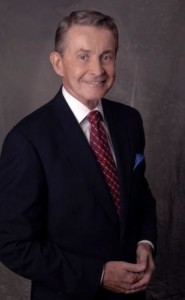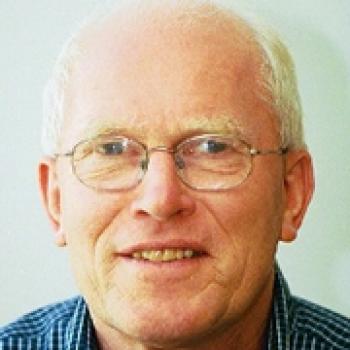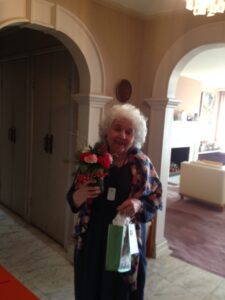Meet Our Members
Meet some of our members and learn about their interesting backgrounds to see the type of people you will meet when you join Georgetown Village!

The late Bill Plante got into broadcast journalism after deciding he didn’t much care for law school. A Chicago native, Plante spent three years at a Milwaukee TV station, then received a fellowship from CBS News for study at Columbia University, where he studied Political Science.
Joining CBS News in 1964, Bill reported on the Civil Rights movement, including Dr. Martin Luther King’s march from Selma to Montgomery. He also covered the Vietnam war on four assignments between 1964 and 1975 and every Presidential campaign since 1968.
Bill says political reporting was always his first love. He came to Washington in 1976 after reporting on Jimmy Carter’s campaign, then became a White House correspondent for CBS News after the election of Ronald Reagan. He covered the State Department during the Presidency of George H.W. Bush and returned to the White House to report on Presidents Clinton, George W. Bush, and Barack Obama. “To be at the White House every day was a privilege,” he says, “it was the opportunity to see history made from a front-row seat.”

Florence Stone leads a fascinating life as the founder of multiple film festivals and with her experience living abroad for many years. Due to her husband’s time working in American embassies and bureaus around the world, Stone was able to spend six and a half years living in places like Rio and Paris. While in Rio she even held a brief part-time job at the embassy!
After coming back to the United States, Flo found herself in New York and was able to get a job at the American Museum of Natural History. This was originally only supposed to be a three-month position, but it ended up lasting for 15 years! She was hired to assist with public programming and this role position involved tasks ranging from editing the in-house newspaper to helping with whatever problem was raised in the museum. Later she was able to start the Margaret Mead Film Festival through this job. This was the first documentary film festival in the U.S. and with this festival, she hoped to foster an appreciation for cultural diversity.
Years later, Flo and her husband moved to Washington D.C. but soon realized how much she missed film. She had thought of the idea of the Environmental Film Festival but originally no one took an interest. One day while working to help various art museums, grassroot organizations and universities, Flo received a call at around 11:30 am from a small organization in Brooklyn. It was the Golden Rule foundation expressing interest in her idea! However, they needed a proposal by 2pm. She put together was she could in that short period of time and that was the start of the Environmental Film Festival in 1993. Since its founding 28 years ago, many similar film festivals began popping up all over the world, creating a “green festival network”.
Now in Georgetown, Flo has found new communities to be a part of in her neighborhood. She was a founder of Trees for Georgetown, worked with two architects published a Map of Georgetown, and also found the Georgetown Village. It is very important not to feel isolated at this age and she expressed how helpful this organization is. Flo especially appreciates her ability to reach the office with a question or concern whenever needed.

Hans Kaper has been a member of Georgetown Village since its launch in 2011. Currently, Hans is researching the environmental crisis at Georgetown University. From a young age, Hans loved math and was able to see how it could be used to assist in solving the issues of society.
Before beginning this research and moving to Georgetown, Hans and his family came to the United States from the Netherlands in 1969. The 50-year anniversary of this move just recently passed! He moved with his wife and two young children to Chicago, Illinois to pursue a generous job offer in the University of Chicago’s energy lab. In 1976, they returned to Europe for about a year to ensure that all members of the family were comfortable permanently moving to the states. This trip showed the family how much they had changed since the move and how much the country had changed since they were gone. The U.S. was now their home and they decided to officially become citizens.
In 2008, Hans came to Washington D.C. and began his work at Georgetown University. He studies the consequences of our behavior as a society on the environment and is currently focusing on food insecurity. This is already a major problem and its effects can be seen all over the world. Food, water, and energy are the three things we most rely upon to survive. If we lose one, it could permanently hurt society. Water shortages in India is already a visible problem. He is currently looking to answer questions such as can you replace animal-based diets with a plant-based diet? Is this even possible without losing necessary nutrients? Would it take up more or less land? How do you convince people to make the switch? Hans is happy to discuss these issues with others, feel free to reach out to him to continue the conversation. He has applied his knowledge to the study of climate change and even gave two fascinating presentations to the members of the village and to the men’s lunch group. A few of our members even commented that this was the first time they were truly able to understand the issue.
Hans describes living in DC as what he would assume living in a colony would be like — no representation, no voice, no choices. However, he soon found the village. He and his wife wanted to stay away from nursing homes and the Village was a great option and a great way to get to know their new neighbors. At this point in time they don’t need to rely on the services too heavily, but he does go to the monthly men’s lunches once a month and enjoys going on the museum excursions. Helen is a long-time member of the book group.
When you meet Hans at one of our activities, be sure to ask him about his 2018 bike trip across the Netherlands with his grandchildren!

Upon hearing about the Village concept at a community meeting many years ago, Joan was glad to be in on the ground floor of starting a similar Village in Georgetown. She became a founding board member of the Georgetown Village and has been an active supporter ever since, driving members to doctor’s appointments and serving on both the Volunteer and Communications committees.
Joan’s father was George F. Kennan, a diplomat who served later in his career as Ambassador to both the Soviet Union and Yugoslavia. Although she was born in the US, at age two months, she experienced her first transatlantic voyage on the same ship which transported the American Olympic team to the Olympic games in Germany (the family still has some photos of the US fencing team practicing on deck.) These were the same Olympics where Jesse Owens, a black man, stunned and humiliated Adolph Hitler, by winning four Track and Field gold medals, damaging Hitler’s views about Aryan superiority. In subsequent years, her father was stationed in Russia, Czechoslovakia, Berlin, Portugal and once again, in Russia. In Portugal, school lessons were provided by an English Governess; in Moscow, Joan was home-schooled by her mother and occasionally, a reluctant older sister. She had no formal schooling until the fifth grade when the family returned to the US.
In 1967, Joseph Stalin’s daughter, Svetlana, defected to the United States. As George Kennan had helped to make the arrangements for her to come to America, he felt responsible for her welfare after her arrival in New York in April of that year. The question was “where should she stay?” and it was finally agreed upon that she should spend the summer at the Kennan family farm in Pennsylvania where she would be somewhat isolated and sequestered from the media. Since the senior Kennans already had other plans for the summer, Joan was the official “host”. Looking back on this episode of her life, Joan marvels that the Russians, who were furious that the daughter of their former leader had defected to their mortal enemy, the United States, never tried to assassinate her during this time – she had no protection at the farm of any kind and the doors weren’t even locked at night.
After Joan graduated from Connecticut College, she married and had two children. Her husband signed up for the Peace Corps and the whole family moved, first to Tonga and then Micronesia. The marriage ended, and Joan returned to the US, living first in San Francisco, and moving ultimately to Washington, DC where she worked as director of the Arcana Foundation which funded social service organizations dedicated to assisting the neediest population of the city.
Joan has seen the role that the Georgetown Village has played in the lives of its members. Not only do members rely upon the Village’s many volunteer services, but their lives are enriched by the Village’s social activities which afford members a greater sense of belonging to a community – so important for people living alone. Not all older residents – Georgetown residents who are still active and independent – feel that they need services, but fortunately, if and when they do, the Village will be there.

Joseph Goulden was not always from Washington D.C., being a best-selling author and an active member of Georgetown Village. He grew up in a small town in Texas with a population of 20,000 people. Here is where he learned to read at the age of five, and since then has been addicted to books. He describes himself as a self-proclaimed “bibliomaniac” who will read whatever is put in front of him.
These years of reading led him to his career as an author. Joe first spent time for newspapers with the goal of learning to write, rather than just being able to read. He eventually came to D.C. as White House correspondent for the Philadelphia Inquirer during the presidency of Lyndon B. Johnson. Joe relates that Johnson frequently brought trusted journalists into his office after hours and spoke casually off the record. Joe recalls, with amusement, that “Lyndon could out-curse any sailor!” – but is on his list of “Our Five Best Presidents.”
After 10 years in journalism, Goulden was offered his first book deal with a 6-week deadline. He took this offer and finished the book on time. During one period, he essentially “went broke” when several books did not sell. But over the years he wrote 18 other books, including The Superlawyers, a New York Times best-seller for 23 weeks. For his book on the Korean War he gained access to classified Pentagon papers that enabled him to write “The Untold Story of the War,” his subtitle. This book was even translated into Chinese!
Joe’s time and experiences with Georgetown Village has made him very appreciative with the work that we do. The volunteers sent to go on walks with him around the neighborhood are “invaluable” and have helped him speed his recovery from surgery. Joe has been able to take more advantage of the village as he ages and finds the community support “amazing”. He says that it means a lot to have this support system whenever he may need it. As a founding member, he has also seen the positive impact the Village has made on his fellow members.
When you see Joe at one of our events, be sure to ask him about his stock car races when he was much younger.
 Moving around the world and leaving your home to seek refuge from war is not something anyone needs to do, but Sylvia Modelski was able to make the most of it by pursuing her education and eventually turning her life story into a successful book!
Moving around the world and leaving your home to seek refuge from war is not something anyone needs to do, but Sylvia Modelski was able to make the most of it by pursuing her education and eventually turning her life story into a successful book!
Sylvia was born in Egypt but was still a British subject by birth. She lived in Port Said for a while but then had to move to Cairo for a safer environment. She began her studies there but as the war worsened, her family decided to move to England. London was still recovering from the bombings and Sylvia was accepted into the London School of Economics although she would have preferred a school that offered more liberal arts courses. She was always artistically inclined, and shared that economics was not her area of interest. However, Sylvia made the most of it and learned some useful information. More information about these moves can be found in her book “Port Said Revisited”, a fascinating read.
Besides her skills in writing and translation, Sylvia was attracted to visual arts particularly painting. From an early age, in Egypt, Sylvia attended the studio of an Italian painter, where she discovered her love for art. After moving to the less appealing climate of London, her art was put on hold until Sylvia and her husband, George, found themselves in Australia where w “the brilliant sunshine re-awoke the artist in [her].” When her husband’s job moved them to the United States, she was able to enroll at the Art Institute of Chicago for a year and immediately after that studied for another year at the New York School of Art. Sylvia happened to be studying at these schools for the more “crucial years immediately following the birth of Abstract-Expressionism”! When they moved to Seattle long-term, the “local climate dried up [her] artistic ambitions”.
After the death of her husband, Sylvia came across the Georgetown Village and joined knowing this is a great support system and is there for her whenever she is in need of assistance. Since her husband passed away Sylvia found herself leaving the house less often, but with the village she is now able to go on the occasional outing or museum trip. Through the village she has made gotten close with other members and found new connections in her community.
When you see Sylvia at one of our events, be sure to ask her about her impressive knowledge of languages and her years spent working in translation!





 Moving around the world and leaving your home to seek refuge from war is not something anyone needs to do, but Sylvia Modelski was able to make the most of it by pursuing her education and eventually turning her life story into a successful book!
Moving around the world and leaving your home to seek refuge from war is not something anyone needs to do, but Sylvia Modelski was able to make the most of it by pursuing her education and eventually turning her life story into a successful book!